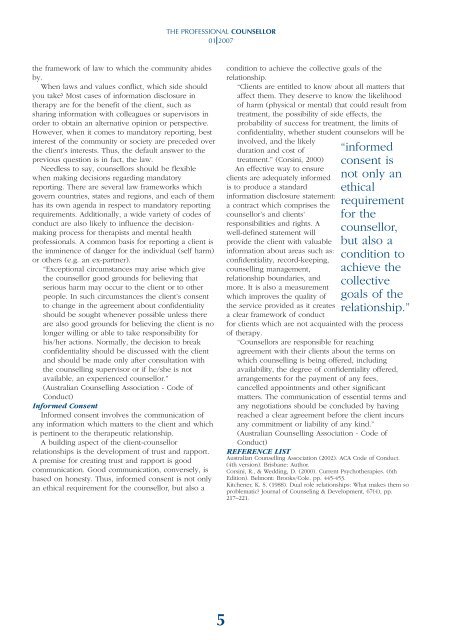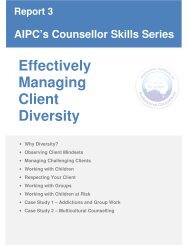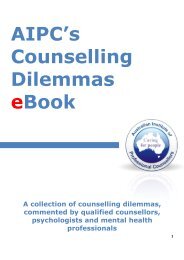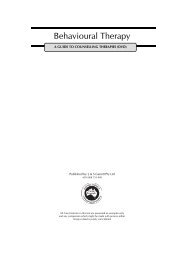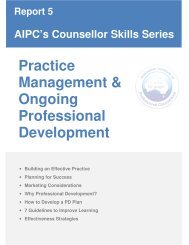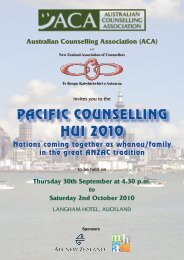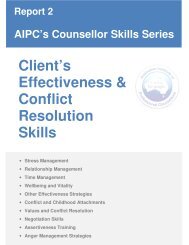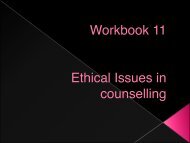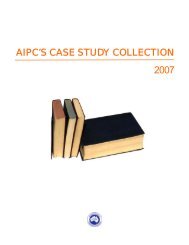THE <strong>PROFESSIONAL</strong> <strong>COUNSELLOR</strong>01 2007FEATUREEthical Situations in Counselling Pedro GondimA prominent aspect of counsellor training involvesthe analysis of ethical situations. Counsellors need tobe malleable to the variety of situations in which theclient’s personality traits and environmentalcircumstances are prominent barriers to therelationship’s progress.Codes of practice, ethical guidelines and counsellingmicro-skills play a role in supporting the counsellor’sdecision-making process towards the relationship;“Counsellorsought toascertain clearand realisticboundariesaround theprofessionalrelationshipwith theirclients”however, client and situationuniqueness are not theexception in the therapeuticprocess – they reign supreme.Effective counselling invokesthe ongoing need foradaptability and criticalanalysis.In this context, threesituations which frequentlygive rise to ethical dilemmasare dual relationships,mandatory reporting andinformed consent. Are youaware of the particularconditions which delineateeach of these situations, and how to act upon them?This article provides a snapshot of the topic, alongwith some strategies for practising and studentcounsellors who are likely to face similar situationsthroughout their careers.Dual RelationshipsDual relationships can be defined as socialinteractions between counsellor and client, in additionto their professional (or therapeutic) relationship.Because the relationship was initiated in a therapeuticenvironment – which invokes behavioural restrictionsand requires particular decorum from both entities –clients and counsellors are likely to face naturalobstacles when developing relationships outside of thecounselling room. As Corsini (2000, p. 447) states:“It is often awkward for both the therapist and theclient when interactions occur outside thepsychotherapeutic relationship. Some relationships,such as those that include sexual or financialinvolvement, clearly violate the ethical codes ofalmost all professional organizations. Others, suchas allowing a client to buy the therapist a cup ofcoffee after a chance meeting in a restaurant,appear to be quite harmless. Most decisions are notthis straightforward, however, and decidingwhether to accept a Christmas gift or flowers forthe waiting room can become a vexing dilemma”.The main question to be asked is how muchinfluence particular social interactions can wield in theprofessional relationship – that is, the counsellor’sperspective towards the client, and vice-versa. Simpleinteractions, such as a chat on the street or even thecup of coffee cited by Corsini are likely to have littleinfluence over both entities’ mindsets, thus it isgenerally not perceived as a challenging situation. Butcertain situations which induce emotional attachmentcan be damaging to counselling goals and/oroutcomes.<strong>Mental</strong> health professionals diverge in opinionswhen it comes to dual relationships. However, the vastmajority of therapists agree that dual relationshipsshould be avoided, arguing that transference andcounter transference are powerful responses that willinevitably influence the therapeutic relationship. Alongwith most ethical dilemmas, it is largely a matter ofeach case: context, individual personality traits andnature of the counselling relationship.According to Karen Kitchener (1988), the types ofdual relationships which were most likely to bedetrimental to a therapeutic relationship included thefollowing aspects: “incompatibility of expectationsbetween roles; diverging obligations associated withdifferent roles, which increases potential for loss ofobjectivity and; increased power and prestige betweenprofessionals and consumers, which increases thepotential for exploitation”.To surpass difficulties with dual relationships,counsellors ought to ascertain clear and realisticboundaries around the professional relationship withtheir clients. Such boundaries need to consider theneeds and characteristics of each client, and how thatwill reflect in the overall relationship. Codes ofpractice and guidelines are important to set theseboundaries; however, professionals must be sensitiveto particular needs in each relationship and apply suchknowledge to improve decision-making in thecounselling process.Mandatory ReportingMandatory reporting, or duty to warn, is one of themost sensitive topics in therapy and mental health.The bare existence of this concept already conflictswith ethical principles of confidentiality, thus decidingto report a client is a paradoxical pattern of thinkingfor any such professional. Nevertheless, it is anextremely important issue.It can be defined as the necessity to break clientconfidentiality in order to protect the client or thecommunity as a whole, when the client imposes athreat to his/her own safety, the community’s safety or4
THE <strong>PROFESSIONAL</strong> <strong>COUNSELLOR</strong>01 2007the framework of law to which the community abidesby.When laws and values conflict, which side shouldyou take? Most cases of information disclosure intherapy are for the benefit of the client, such assharing information with colleagues or supervisors inorder to obtain an alternative opinion or perspective.However, when it comes to mandatory reporting, bestinterest of the community or society are preceded overthe client’s interests. Thus, the default answer to theprevious question is in fact, the law.Needless to say, counsellors should be flexiblewhen making decisions regarding mandatoryreporting. There are several law frameworks whichgovern countries, states and regions, and each of themhas its own agenda in respect to mandatory reportingrequirements. Additionally, a wide variety of codes ofconduct are also likely to influence the decisionmakingprocess for therapists and mental healthprofessionals. A common basis for reporting a client isthe imminence of danger for the individual (self harm)or others (e.g. an ex-partner).“Exceptional circumstances may arise which givethe counsellor good grounds for believing thatserious harm may occur to the client or to otherpeople. In such circumstances the client’s consentto change in the agreement about confidentialityshould be sought whenever possible unless thereare also good grounds for believing the client is nolonger willing or able to take responsibility forhis/her actions. Normally, the decision to breakconfidentiality should be discussed with the clientand should be made only after consultation withthe counselling supervisor or if he/she is notavailable, an experienced counsellor.”(Australian Counselling Association - Code ofConduct)Informed ConsentInformed consent involves the communication ofany information which matters to the client and whichis pertinent to the therapeutic relationship.A building aspect of the client-counsellorrelationships is the development of trust and rapport.A premise for creating trust and rapport is goodcommunication. Good communication, conversely, isbased on honesty. Thus, informed consent is not onlyan ethical requirement for the counsellor, but also acondition to achieve the collective goals of therelationship.“Clients are entitled to know about all matters thataffect them. They deserve to know the likelihoodof harm (physical or mental) that could result fromtreatment, the possibility of side effects, theprobability of success for treatment, the limits ofconfidentiality, whether student counselors will beinvolved, and the likelyduration and cost oftreatment.” (Corsini, 2000)An effective way to ensureclients are adequately informedis to produce a standardinformation disclosure statement:a contract which comprises thecounsellor’s and clients’responsibilities and rights. Awell-defined statement willprovide the client with valuableinformation about areas such as:confidentiality, record-keeping,counselling management,relationship boundaries, andmore. It is also a measurementwhich improves the quality ofthe service provided as it createsa clear framework of conduct“informedconsent isnot only anethicalrequirementfor thecounsellor,but also acondition toachieve thecollectivegoals of therelationship.”for clients which are not acquainted with the processof therapy.“Counsellors are responsible for reachingagreement with their clients about the terms onwhich counselling is being offered, includingavailability, the degree of confidentiality offered,arrangements for the payment of any fees,cancelled appointments and other significantmatters. The communication of essential terms andany negotiations should be concluded by havingreached a clear agreement before the client incursany commitment or liability of any kind.”(Australian Counselling Association - Code ofConduct)REFERENCE LISTAustralian Counselling Association (2002). ACA Code of Conduct.(4th version). Brisbane: Author.Corsini, R., & Wedding, D. (2000). Current Psychotherapies. (6thEdition). Belmont: Brooks/Cole. pp. 445-453.Kitchener, K. S. (1988). Dual role relationships: What makes them soproblematic? Journal of Counseling & Development, 67(4), pp.217–221.5


